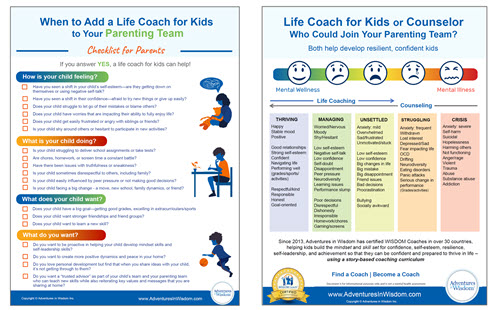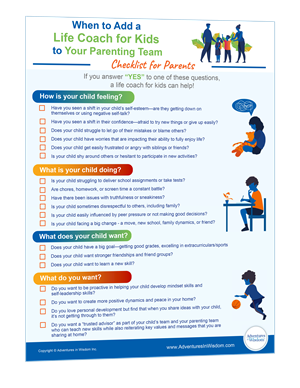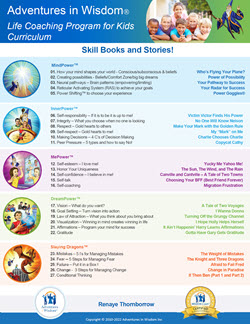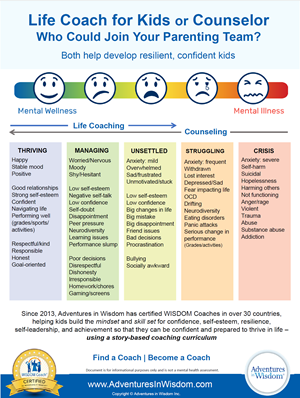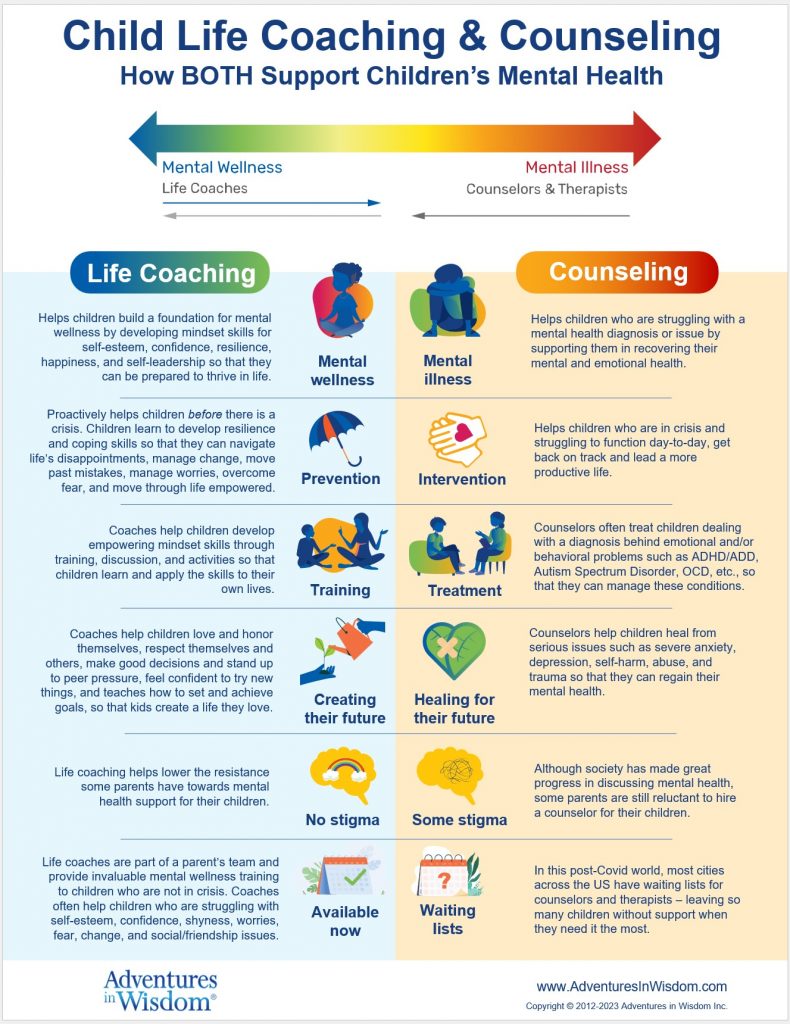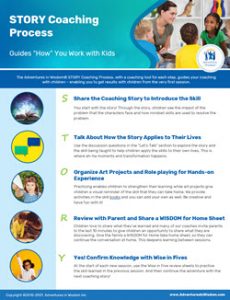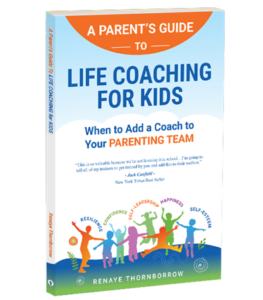Parents, is Life Coaching for Kids Right for Your Child?
As a parent, you are your child’s hero, offering love, support, and guidance. You shape their morals, character, and education, while nurturing their talents in activities such as sports, music, and art. You celebrate their successes, comfort them in disappointments, and care for their health—providing love and support throughout their lives.
Sometimes our children need additional support, and we’re not quite sure how to help.
When faced with challenges and disappointments, most children don’t have the tools to handle them. As a result, they may get down on themselves, which crushes their self-esteem, or they give up on themselves, which crushes their confidence.
Parents often notice this shift, but aren’t sure how to help their child.
As parents we want our children to walk in the world with their head held high—loving who they are, navigating the ups and downs of growing up, going for their goals, and most importantly to be happy.
The big question is, how do we help them get that?
Because no matter how much we love our children, we can’t get them confidence, self-esteem, happiness, or success in their lives, but what we CAN do is help them develop it in themselves.
And life coaching for kids can help! Helping children develop the mindset and skill set to be confident and prepared to thrive in life.
A Parent’s Guide
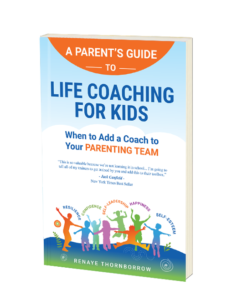
Just like an athletic coach helps children develop the skills, confidence, and ability to thrive in their games, a life coach for kids helps children develop the skills, confidence, and ability to thrive in life.
Checklist
When to Add a Coach to Your Parenting Team
Below is a a checklist you can use to determine if working with a life coach for kids could benefit your child. If you answer “Yes” to any of these questions, a Certified WISDOM Coach can help!
How is Your Child Feeling?
- Have you seen a shift in your child’s self-esteem—are they getting down on themselves or using negative self-talk?
- Have you seen a shift in their confidence—afraid to try new things or give up easily?
- Does your child struggle to let go of their mistakes or blame others?
- Does your child have worries that are impacting their ability to fully enjoy life?
- Does your child get easily frustrated or angry with siblings or friends?
- Is your child shy around others or hesitant to participate in new activities?
What is Your Child Doing?
- Is your child struggling to deliver school assignments or take tests?
- Are chores, homework, or screen time a constant battle?
- Have there been issues with truthfulness or sneakiness?
- Is your child sometimes disrespectful to others, including family?
- Are you concerned about your child’s ability to resist peer pressure or make good decisions?
- Is your child facing a big change—a move, school, family changes, or friendships?
What does Your Child Want?
- Does your child have a big goal—making good grades, excelling in an extracurricular activity, or making a sports team?
- Does your child want stronger friendships and friend groups?
- Does your child want to learn a new skill?
What do You Want?
- Do you love personal development and want to be proactive in helping your child develop mindset skills and self-leadership skills?
- Do you want to develop more positive dynamics and peace in your home?
- Do you want a “trusted Advisor” as part of your child’s team and your parenting team who can teach new skills while also reiterating key values and messages that you are sharing at home?
“No matter how much we love our children, we can’t give them self-esteem, we can’t give them self-confidence, and we can’t give them success in life. But what we can do is help them develop it in themselves so that they can handle the ups and downs of growing up and thrive. Mindset skills are the key!“
What is Life Coaching for Kids?
A life coach for kids helps children develop the mindset and the skill set needed to be confident and prepared to thrive in life.
Mindset is our thinking as we move through life—it shapes our beliefs.
Skill set is knowing what actions to take to create the results we want to create in life.
How does WISDOM Coaching Help Children?
WISDOM Coaches help children learn the brain science behind how their minds work—helping them understand that their thoughts shape their experiences.
Children learn how to identify and shift limiting beliefs that can harm their self-esteem and hold them back in life. And they learn how to proactively develop supporting beliefs that help them feel empowered in their lives and make good choices.
It is important to understand that coaches don’t teach children what to think, they support children in learning how to think so that their mind is working for them and not against them.
Coaches also teach children how to navigate life’s challenges and build essential life skills.
Key areas of development include:
- Resilience and Coping Skills: Children learn to handle life’s ups and downs—overcoming mistakes, challenges, and disappointments—so they can bounce back and continue pursuing their goals.
– - Self-Esteem: Children build self-esteem from the “inside out,” basing their self-worth on who they are rather than external factors, helping them maintain a strong sense of self regardless of their circumstances.
– - Confidence and Belief in Themselves: They learn to move past anxiety and fear, stepping outside their comfort zones to build courage and pursue their dreams with confidence.
– - Inner Compass and Self-Leadership: Children develop core values such as integrity, self-responsibility, and respect. They also learn to think independently, resist peer pressure, and stay true to their values.
– - Intentional Living and Goal Achievement: Children learn to set a vision for their lives, understand the brain science behind achievement, and use tools like visualization, affirmations, and gratitude to reach their fullest potential.
See the 27 Skills WISDOM Coaches can help your children develop
Click to Get the 1-Page List of Skills and Stories
The time to work with children on issues they will face in high school is before they get there.
The foundation we help our children build at a young age impacts the rest of their lives–and ours too!
Coaching and Counseling
If you view mental health as a continuum—with mental wellness on one end and mental illness on the other—counselors and therapists can support children across this entire continuum. However, their primary focus is often on helping children who are struggling move back toward a state of mental well-being and ability to function in daily life.
Counselors and therapists tend to work with children who are experiencing more serious issues such as severe anxiety, depression, addiction, OCDs, moving past neglect/ abuse, or going through a personal crisis. With the shortage of mental health professionals available to support children, very few counselors have the opportunity to work with children who are NOT facing immediate challenges but still need support—leaving a gap in helping them build skills for mental wellness.
Life coaching for kids focuses on mental wellness and helping children proactively develop a healthy mindset, which is the first step in managing anxiety in children. Life coaching for kids supports children in recognizing and shifting limiting thought patterns and proactively creating supporting thought patterns to help minimize anxiety – while developing strong coping skills and resilience so they can persevere and thrive.
Coaching and counseling both play a critical role in children’s mental health.
What are you noticing?
Click image to download your copy
(IMPORTANT: Document is for informational purpose only and is not a mental health assessment)
How to choose?
If your child is in crisis, self-harming (threatening to self-harm), or facing an issue that is impacting their ability to function in life, then contacting a mental health provider, such as a counselor or therapist, would be the best choice for your child.
If your child is NOT in crisis, and you are looking to support your child in improving self-esteem, building confidence, overcoming shyness, being more responsible, being a self-leader, and learning to achieve their goals, then adding a coach to your parenting team would be a powerful solution for your child.
If you’re not sure, talk with your child’s pediatrician and/or have a counselor assess the situation first. Many of our coaches have worked with children who were also working with a counselor because coaching is very different from counseling and both support children’s mental health.
Here’s an infographic that shows how Coaching and Counseling BOTH support child mental health. (Click on the image to download the infographic)
11-year-old Alex Gets Help from Coach while on Waiting List for Counselor
When 11-year-old Alex was so anxious that she couldn’t go to school, her parents were desperate to find her help. And there were long waiting lists for child counselors.
They learned about WISDOM Coach Lisa’s life coaching for kids services, so they thought they’d give it a try while they waited.
After one coaching session, Alex returned to school and didn’t miss another day! And her story gets better.
How Coaching Complemented Therapy to get Results for 11-year-old Tina
11 year-old Tina was struggling with belief in herself, telling the truth, being kind to others, and negative self-talk.
She had been in therapy for a few years and made some progress with her anger management and regulating emotions.
Given Tina’s progress with regulating her emotions and anger, Tina’s mom felt that now would be the right time to start life coaching, so that Tina would open up more, talk about her struggles, learn to manage mistakes and failures, and become happier overall.
Read about her incredible results including what Tina, her mom and WISDOM Coach Delia had to say.
Scott Shifts his Thinking During COVID
When 9-year-old Scott first entered lockdown during the pandemic, he struggled with virtual school and the uncertainly in his life.3 He missed his friends and teachers and was anxious and worried.
He worked with WISDOM Coach® Tara around managing change. Through the coaching story Changes in Paradise, Scott realized that children experience changes in many different ways. He learned that he could shift how he was thinking about change and choose thoughts that helped him.
By the end of the session, he was able to identify positive things about the changes he was experiencing and learned how to embrace the changes so that he would feel happier.
How does a WISDOM Coach work with your child?
A WISDOM Coach helps your child develop skills using the story-based coaching curriculum and proven STORY Coaching Process from Adventures in Wisdom®.
Before working with your child, the coach will meet with you (and often your child) to determine your family’s goals for coaching.
Based on your conversation, they will recommend a coaching package that includes a set of skills to achieve the goals–this could be boosting self-esteem, enhancing confidence, building resilience, developing self-leadership, achieving a goal, navigating a change, etc.
Coaches work LIVE with your child (in person or online).
Live coaching is critical because it creates a human-to-human connection–offering an emotionally safe space for them to learn, practice, and apply the skills to their own lives. It also enables the coach to shift the skills being taught if the child is facing a particular challenge that needs to be addressed.
A WISDOM Coach® is part of your child’s team and part of your parenting team!
What should I look for when hiring a coach for my child?
1. Is your coach using a child-focused coaching curriculum?
Coaching children is very different from coaching adults, making it essential to choose a coach who uses a curriculum specifically designed for kids.
The key difference is brain development.
An adult’s brain is very different from a child’s brain, not only in development but also in the life experiences they can draw upon.
Adults have fully-developed frontal lobes, which enhance their critical thinking skills. This is why life coaches for adults primarily use questions to engage their clients.
However, this question-based coaching approach isn’t effective for children. A child’s brain, particularly the frontal lobe, is not yet fully developed, leading to a lack of advanced critical reasoning skills.
A coaching process centered around questions can lead to frustration for children, and the coaching won’t be as effective.
When coaching children, it is important to incorporate a teaching component to help them develop their skills. While questions are still part of the process, look for a coach who will blend training with coaching to enhance understanding and the effectiveness of the coaching for your child.
WISDOM Coaches use coaching stories written in a fable format to help teach mindset skills to kids and it’s very effective.
2. What does the coaching process?
When selecting a coach, ask about their coaching process.
- How do they support children in developing skills and ensuring that learning and change is happening? Do they have a proven process?
- Do they have flexibility in their approach to working with your child? Every child is unique, and the coach should be able to adapt their coaching style and the skills they teach to meet your child’s specific needs throughout the coaching engagement.
- How do they involve you as a parent? Some parents prefer to be more involved in the process than others, and your coach should be able to adapt to your family’s needs.
WISDOM Coaches use a proven story-guided coaching curriculum and step-by-step STORY Coaching Process when working with your child. They are not forced into a certain process and can adjust sessions based on what will most support your child at the time. They also involve you in the process and you receive a 1-page WISDOM for Home sheet that supports you in continuing the conversation at home.
3. Is the coach certified?
Child life coaches will have varying backgrounds and credentials, so it’s important to inquire about their certifications. Specifically, ask if they are certified in a child life coaching curriculum or a child-specific program.
4. Does your child have any special considerations?
Does your child have any neurodiversity, such as learning differences, ADHD, or being on the autism spectrum?
There are children’s coaches specifically trained to work with neurodiverse children. Be sure to share any special considerations during the intake process so that only qualified coaches respond.
5. Is there rapport between you and your coach?
Most coaches will start with an intake process and a discovery call with you. This is your opportunity to meet your child’s potential coach to make sure it is a good fit for you and your child.
IMPORTANT
When hiring a coach for your child, follow the same screening you would normally follow when hiring anyone to work with your child. Because coach training organizations have coaches from around the world, they are not able to conduct background checks on each coach (which vary from country-to-country and sometimes state-to-state).
Can I coach my own child?
You might be wondering if you can coach your own child? The answer is YES!
Sometimes coaches start by wanting to help their own children first, and then get excited about coaching other children as well.
It is important to understand that sometimes children respond better to someone who is NOT their parent. Maybe you’ve seen this when trying to “coach” your child in a sport or help them with homework.
I that happens, it is NOT a reflection on you or your skills as a parent. It’s just part of the parent/child dynamic that can exist around certain situations. Sometimes our coaches hire other coaches from within our community to coach their own children because of this same dynamic.
Just like you would hire a sports coach to give your child an edge in the sport they are playing, or a tutor to give your child a boost in a subject they might be struggling with, or hire a music or art teacher to support your child in enhancing their skills in extracurricular activities, a life coach will support your child in developing the mindset skills that will help them thrive in all areas—academics, extracurricular activities, emotionally, socially, and at home.

The best way to start is to download the free coaching story (see the tab at the very top of this website) and try it out at home. See how your child responds to you when sharing the skills.
When you download the “free coaching story” you will get the full “skill book” which contains both the Mentors Guide with background information and coaching tips for you as well as the Children’s Guide where you will find the coaching story, discussion questions, and activity. Have fun connecting with your child and building the skill of positive self talk!
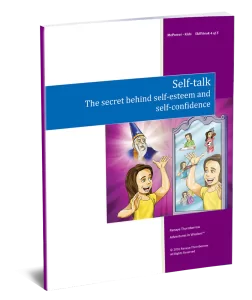
A Parent’s Guide to Life Coaching for Kids
Renaye Thornborrow wrote A Parent’s Guide to Life Coaching for Kids – When to Add a Coach to Your Parenting Team to help build awareness amongst parents about the powerful impact that life coaching for kids is having on children and families.
Here is a Description of the Book
As parents, no matter how much we love our children, we can’t give them confidence, self-esteem, resilience, happiness, or success in their lives. What we CAN do is help them to develop it in themselves—and life coaching for kids can help!
Life coaching is a game-changer for our children when they learn how to develop the mindset (“growth mindset”) and the skill set needed to be confident and prepared to thrive in life.
This book answers key questions about how life coaching is helping children and when you might want to add a coach to your parenting team.
- Learn how coaching differs from counseling and parenting
- Learn why parents hire a coach for their child—get your checklist
- See real-life results of how coaching has helped children rebuild self-esteem, boost their confidence, bounce back from disappointments, manage stress, become self-leaders, achieve big goals, and calm anxiety in children
- Learn how WISDOM Coaches use stories to help your child develop skills for life




